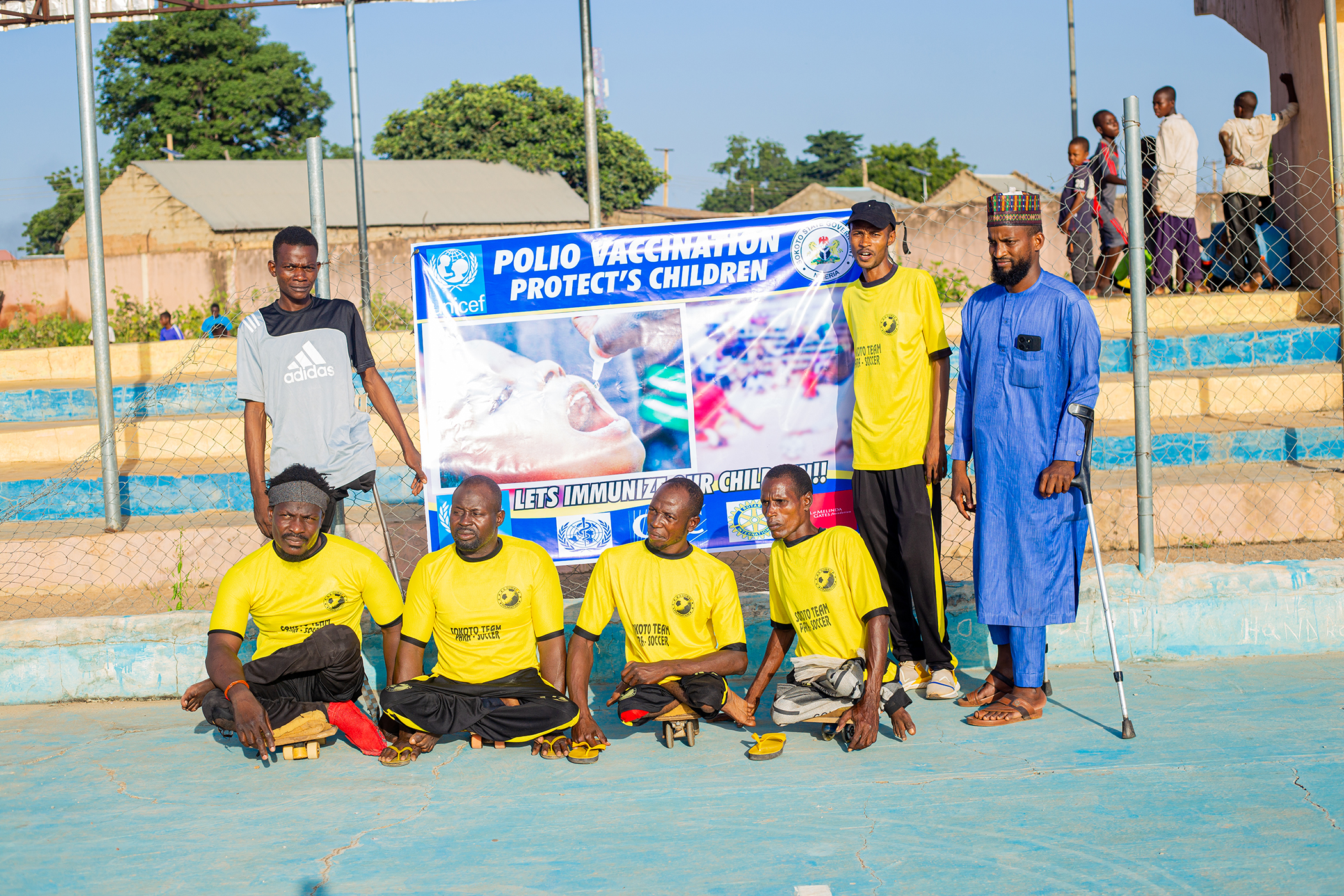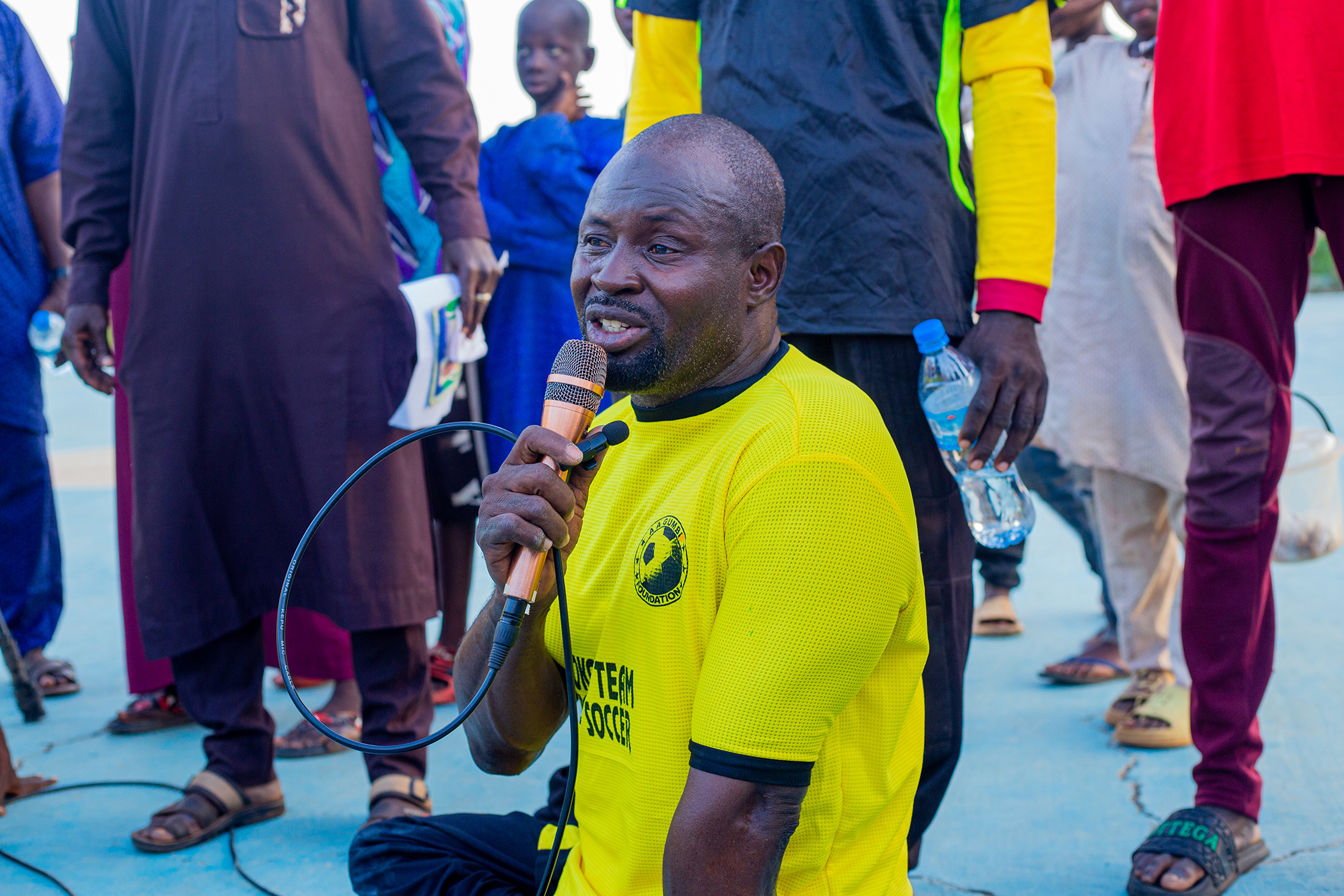The midday sun casts a glow over a football field in Sokoto State, Nigeria, where a para-soccer match draws an eager crowd of hundreds watching from the sidelines.
Mukhtar Sani Doki, a celebrated para-soccer player, maneuvers on his skateboard towards the goal post, as his hands push the ball into the net, scoring a goal for his team.
Para-soccer, a fast-paced and competitive version of football, was designed for individuals affected by paralysis. Players — the majority of whom are polio survivors — move around the field on skateboards, and use their hands instead of their feet to kick the ball.
 Mukhtar Sani Doki shares archival photos of his polio advocacy and his para-soccer activities during an interview in Sokoto State, Nigeria on March 4, 2024.
Mukhtar Sani Doki shares archival photos of his polio advocacy and his para-soccer activities during an interview in Sokoto State, Nigeria on March 4, 2024.
Spectators fill the stands for this special tournament on World Polio Day (October 24) where Sani Doki, together with other athletes, share their personal stories with the audience.
Sani Doki contracted polio at the age of two due to missing an immunization. After suddenly falling ill, he lost mobility in his legs overnight. That didn’t stop him, however, from going to school or learning how to ride a tricycle.
“I used to interact with children. When we would play, they would use their legs to kick the ball and I would use my hands, and I would feel comfortable,” Sani Doki told Global Citizen.
Now Sani Doki has made it his mission to inform others that while polio is not curable, it is fully avoidable by vaccination. Whether it’s a few dozen spectators or thousands — as is the norm for national competitions — Sani Doki and other polio survivors strategically use breaks between games to create awareness about the need for parents and caretakers to allow children below the age of five to receive polio vaccines.
“We have a lot of community dialogue to inform the citizens that polio is real and the only way to protect our child is through immunization,” said Sani Doki.
These athletes, who are sometimes joined by community health workers, will share their personal stories of contracting polio, answer questions, and encourage immunizations.
Over the last five years, routine childhood immunization in the countries where most polio cases are found has dropped from 75% to 70%. This is well below the 95% needed for community immunity, which means children are at risk of contracting life-threatening diseases such as polio.
The state of Sokoto, where Sani Doki is an immunization advocate, has the second highest vaccination non-compliance rate in Nigeria. Non-compliance is the refusal or unwillingness of caregivers to vaccinate their children.
This is where polio survivors like Sani Doki come in. Survivors typically accompany health workers during door-to-door routine immunizations (which include the polio vaccine) or polio vaccination campaigns in response to polio disease outbreaks.
“Whenever there is non-compliance, we [survivors] go and talk to them. We tell them polio is real. As a survivor we feel it and know it better than anyone, and we don’t want our children and relatives to be affected,” said Sani Doki who is also the coordinator of the Association of Polio Survivors in Sokoto.
 Mukhtar Sani Doki, a polio survivor and the coordinator of the Association of Polio Survivors, speaks with mothers on the need for children to receive the polio vaccine during a Polio Vaccination Campaign in Sokoto State, Nigeria, in March 2024.
Mukhtar Sani Doki, a polio survivor and the coordinator of the Association of Polio Survivors, speaks with mothers on the need for children to receive the polio vaccine during a Polio Vaccination Campaign in Sokoto State, Nigeria, in March 2024.
Sharing personal stories is one of the many strategies used to create awareness about the importance of vaccines and to dispel vaccine hesitancy. Sani Doki has heard it all — from parents who are unfamiliar with polio to those who believe immunizing their children will lead to infertility — a belief “very difficult” to dispel, according to Sani Doki.
“We try to change their mindsets and we try to tell them the reality…We tell them this is not like [other illnesses]. Tomorrow you will not be better [heal]. With polio, when it happens, it happens. No matter how much money you have you cannot [reverse the damage of disease],” he told Global Citizen.
In 2024, four polio immunization campaigns were held in Nigeria in response to polio outbreaks, with each campaign reaching an average of 34.3 million children. There were approximately 14,000 to over 18,000 cases of non-compliance per campaign, so government health workers together with UNICEF and other partners — and polio survivors like Sani Doki — worked to educate non-compliant households on the vaccine and the protection it offers children. In response, approximately 50% of cases were resolved through vaccinations in the first half of the year, which increased to 80% in the later half of the year, according to UNICEF.
According to Mesele Yemane, a Health Specialist with UNICEF, “The data shows a clear improvement in the resolution rates over the months [through] different campaign rounds, indicating effective measures being taken to address non-compliance issues in Sokoto.”
Non-compliance and vaccine hesitancy are issues advocates like Sani Doki and health teams continue to encounter as they implement vaccination campaigns in an effort to eradicate polio in Nigeria. While combating misinformation about polio, Sani Doki and fellow polio survivors also combat stereotypes about people with disabilities.
Sani Doki shares his personal story of embracing sports, pursuing a university education, and even customizing a motorcycle to suit his mobility needs so he could safely and independently commute. All this has led him to become a role model in his community, whose message of determination shines through.
“The physical [limitation] is something that is just physical,but our dedication and intellectual ability is there,” he said, about himself and fellow para-soccer players who are polio advocates. “We play our role in our community and we do our best as citizens. We tell others that in every disability, there is ability.”
 Mukhtar Sani Doki picks up his children after school in Sokoto State, Nigeria, March 2024. Doki and members of the Association of Polio Survivors use their experiences as polio survivors to advocate for parents and caregivers to vaccinate their children.
Mukhtar Sani Doki picks up his children after school in Sokoto State, Nigeria, March 2024. Doki and members of the Association of Polio Survivors use their experiences as polio survivors to advocate for parents and caregivers to vaccinate their children.
The World's Best Shot is a profile series dedicated to sharing the stories of vaccine activists around the world.
Editor’s Note: This article is part of a content series that was made possible with funding from the Bill and Melinda Gates Foundation.

